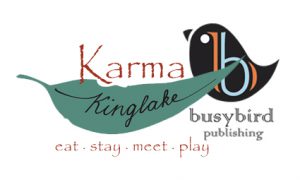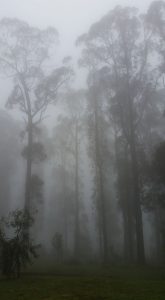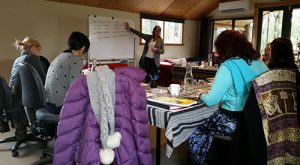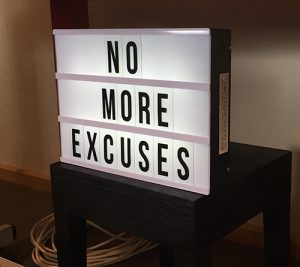

Month: October 2016
Welcome to the Busybird blog, where you can find helpful articles, updates, industry news and more. Make sure you stay up to date by signing up to our newsletter below.
An Exploration of Karma
October 27, 2016 We’re back from Karma!
We’re back from Karma!
And, as you might expect, this is when we give you the sell about what a great weekend it was.
Well, you know what?
It was!
This was our third Karma Writing Retreat, and before each of them there’s been the tiniest trepidation about how groups will gel. You just never know when strangers are relocating to live and interact with one another over the course of a weekend. But every time, the retreat has been a joy.
And here’s a breakdown as to why that happens.

The Karma October 2016 group.
Writers
Arguably, the most difficult thing about being a writer is, well, being a writer. Most people think that all it takes to write a story or a poem or a work of nonfiction is to just sit down and spill the words onto the page. They don’t understand how difficult it is reaching into oneself to find something of value, and to then articulate that in a way that’s going to be structured, cohesive, and engaging. But writers understand. And they understand the issues that pop up – the difficulty in getting their words right, the nagging self-doubt, the intimidation of writer’s block … and this list goes on. It gives writers a frame of reference for discussion even before they’ve met. It gives them empathy with one another.
We had eight participants (and, for one, it was her second successive Karma retreat) this week, a full house for us – the Retreat can fit more, but we think eight is a good number for workshops. Ten people (eight participants, two facilitators) in a room is a conversation; any more, and it becomes a din.
None of the participants knew one another prior to the weekend. But they – along with us, as the facilitators – immediately engaged (and now the participants are going to stay in touch and form their own writing group).

A misty Kinglake morning.
Karma
When Blaise first came up with the idea for a retreat, she scoured possible locations, many of them coastal, but didn’t feel any fit. Karma was a revelation, and also fit Blaise’s own emotional connection to the bush, given she’d grown up on a commune.
Hearing ‘Kinglake’, people might automatically think the retreat is rustic, some backwater with outdoor toilets, cold-water plumbing, and meals cooked over a fire. Karma comprises a main house (with kitchen, lounge by the fireplace, a couple of bedrooms), and ‘nests’, the equivalent of bungalows that spider-web out from the main house. The nests have their own kitchenettes, bathrooms, and heating (fires, and split heating systems; the rooms have bathrooms and split heating systems). It’s luxury nestled in the bush.
Karen
Karen, Karma’s host, deserves to be singled out. Charming and funny, she’s led an amazingly storied life, and painstakingly attends to every need – it’s assuring when you have dietary issues to know that they’re taken care of. Every meal she prepares is a feast (often, the feedback we get raves about the meals), and also comes with desert. You can consider yourself spoiled.
It actually gets to the point that she anticipates your needs before you ever need to articulate them.

Blaise talks about publishing options.
The Workshops
The workshop lessons and exercises are pre-planned, but the regimen remains fluid to accommodate any specific interests the participants have – on this occasion, many of them had an interest in structure. Also, throughout each workshop, particular interests (or needs) might pop up that we then follow and explore.
The workshops provide lots of stimulating discussion, introduce writers to lots of dos and don’ts, and help them understand how they’re going to tackle whatever it is they want to write, and the publishing options that they can pursue. There’s also an actual workshop of each participant’s writing, which gives them a good idea what to look for in the rest of their work.

What are you waiting for?
Transformation
Every participant who’s come to Karma has come nurturing a single question related to their writing, or to their journey as a writer. Examples of these questions are:
- I’ve written in another field; are those skills translatable to what I want to do now?
- What’s the story I want to share?
- How do I get started?
- Can I really write?
- What are the tools I need?
Etc.
And then they’ve come away from the retreat confident and enthused about where to go next.
That transformation is at the heart of what Karma’s about – finding a way to unravel the doubt and to proceed with whatever your undertaking might be. Blaise’s motif for the weekend was ‘No more excuses’, and it’s ultimately about realising – about learning – that’s a truth you have to live by if you want to write.
There are no excuses.
Just write.
And, finally, some praise …
Here’s what this weekend’s participants had to say …
- ‘Just a huge THANK YOU. I LOVED it.’
– Liz
‘Great for novices through to experienced writers. Highly recommended.’
– Jo
‘I learned a lot about writing and publishing.’
– Maryanne
‘If you want to be a writer, do this course!!’
– Linda
‘It’s valuable in terms of people in need.’
– Jude
‘I find workshops help me develop and maintain momentum, and this one was outstanding.
– Lisa
‘I found it extremely informative/useful.’
– Christina
‘Great writing program. Very supportive. It was fantastic!’
– Colleen
Look for our next Karma Retreat in about May of 2017!
Postscript: Want to read the experiences of one of the participants? Check out Christina’s blog here: The art and soul of writing.
Pop Your Bubble!
October 20, 2016 The best way you can learn to write is by writing.
The best way you can learn to write is by writing.
It doesn’t matter how much theory you gorge on, until you execute, until you learn how to articulate your imagination, structure your story, and develop your writing processes, you will never learn to write. It’s in the writing that you work out how you do things, find your voice, and grow as a writer.
But there is a danger in existing and trying to evolve singularly in a bubble. You could write book after book after book. But how will you know what you’re doing well and what you’re not doing well? You could be writing reams of exposition. How’re you going to know? You might think it’s working for you, and just continue to do it, not realising what you’re doing is to your detriment.
This is where it’s important that you do get challenged.
It might just come in submitting. Lots of places use form rejections – usually, they do so not because they want to be cold and impersonal, but because it’s just too time-prohibitive to write a personal response to everybody submitting. However, some journals still offer feedback, as do competitions. Look for those who do (especially if you’re paying money to enter a competition).
Workshops are another great place to be challenged. Here, you can learn about components of writing that you can take away and apply to your own work. You might learn about active versus passive sentences, go away, and in reviewing your own work, find that you write too passively. This is something you might never have encountered if you stayed inside your bubble.
Along the route of workshops, courses are another avenue you might take. Some might not want to commit to some long period of schooling, but there’s always short courses. Find something that appeals to you either personally, or to what you’re writing. There’s lots of great stuff out there.
Find people you trust to share your writing with, people who are going to give you constructive criticism (which usually rules out family). You could join or start a workshopping group, or just find specific people you trust. With the advent of email and the assistance of Track Changes, it’s so easy to do things electronically nowadays.
Pop your bubble!
You need to write. You need to have something down on the page to work with so you can find what your strengths and weaknesses are – where you’re doing okay, and where you can improve. You’ll never know any of this until you do write, because your writing is going to behave as your frame of reference. Writing is always the key. But, at some point, you will need some sort of exposure to learn new things you can apply, or to examine where you need to improve. Just remember something paramount as far as the latter goes: be open.
Don’t ever think that your writing is infallible. Don’t ever believe that you’ve always got it right, and everybody else has got it wrong. One common denominator amongst the better writers is that they’re all open to being challenged, because they recognise that’s how they’re going to get better, and that’s how they’re going to improve whatever they’re working on.
The moment you close yourself off, you’ll stay where you’ve always been.
In a bubble.
The Measure of Success
October 13, 2016 What is the measure of success as a writer? If I could grant you success, what would your definition be?
What is the measure of success as a writer? If I could grant you success, what would your definition be?
Everybody measures success differently, but here are some possible definitions:
- to have a bestseller: we’d all love that, wouldn’t we? To have our book appear on – for example – the New York Times bestseller list.
- to become rich: this is a definition of success in any vocation – to be able to buy whatever you want, whenever you want. As a writer – an industry where the bulk of people don’t live off their writing – how much more validation for your success could you have?
- to win an award: it could be the Miles Franklin or the Man Booker, or even the Nobel Prize. How’s that for recognition? How’s that for success?
- fame: you’re all people talk about when it comes to storytelling, and you’re recognised in the streets.
- adaptation: your books are adapted for film or television.
When you consider how many published authors there are, how many of them manage to get to any of these heights? A fraction? Less? The figure’s even tinier when you think about just how many writers there are, period. Another concern here is if you do reach any of these pinnacles, where do you go? And how do you deal with the pressure of now having to maintain (or surpass) that standard? These are just asides, but they’re important asides because they demonstrate that there is a price to pay for this level of success, however alluring this success might seem.
Some might be more modest with their aspirations:
- to live off your writing: you might be happy living a quiet, unassuming life, and just want time to be able to write.
- having a career in writing and writing-related industries: not only do you write and publish, but work in the publishing industry, perhaps as an editor or teacher.
- being able to publish regularly: regardless what you do to pay the bills, you churn the books out, and even develop a following.
And, honestly, this is the life of most published authors. There’s nothing glamorous about it, but it can still seem unreachable when you’ve published, but your book’s not selling; or when you’re out there, submitting, and dealing with rejections.
Some might just be more hopeful:
- to be published.
That would be nice, wouldn’t it?
This is by no means a definitive list, but it does cover a spectrum of possibilities – all of them material.
Your goals might (seemingly) be more philanthropic:
- to touch a reader: plenty of stories are moving experiences for the reader, the story remaining with the reader, long, long after the reader has put the story down.
- to educate: your field might be nonfiction, and you might want readers to know about something historical, a specialist topic, or just give the reader some self-help tips about leading a better life.
There’s still an element of ego in these possibilities if the author’s intent is to be known for any of these achievements, rather than seeing these achievements exist for the sake of the achievement itself. That’s an important distinction, and it’s worth being brutally honest with yourself to see where you stand because something all these gains share is they all have a qualitative measure – you can measure how many books you’ve sold, how much money you’ve made, how many other people you’ve beaten for an award, how well you’re recognised, how many people you’ve reached, and on that list goes.
Ultimately, that begs the question of how much is enough? Even if your aspirations are modest, how modest are they? The freedom to write is a luxury. Even if your life is hectic – work, partner, kids, household, responsibilities, etc. – and all you can manage is fifteen minutes of writing-time three or four times a week, it’s still a luxury, however hard-won or well-deserved that luxury might be.
And that’s the genuine measure of success – the freedom to write, and to pursue and accomplish your goal, rather than any reward earned from it.
Are YOU a Writer?
October 6, 2016Do you feel instinctively that you’re a writer, that you want to write and share stories with a greater audience? That storytelling is intrinsically a part of who you are? That you can’t live without writing? That – whilst you might have another vocation (to pay the bills) – writing is your true calling?
Do you constantly think about the stories you want to write – when you’re at work, when you’re doing stuff around the house, when you’re parenting, when you’re drifting off to sleep? Do the ideas shoot around in your head, exploding like fireworks, demanding your attention?
Do you attend literary functions, like book launches or readings, to soak up the ambience, enjoy the event, and later chat with like-minded people? Perhaps you talk about writing, talk about processes, talk about plans? Or it could be that you’re encouraged to be with people of your ilk and find it stimulating?
Do you immerse yourself in as much knowledge about the craft of writing as possible? Perhaps you read books or blogs about writing? Or maybe you like Facebook pages about writing, and delight in their memes offering titbits of writing wisdom. You might even share the memes, hoping others will also learn from them? Do you make friends with other writers, wanting to build your social writing network?
Do you do any or all of these things?
Well, if you do, there’s something you should know: none of these make you a writer.
Sure, they’re nice and can help you developmentally, but they’re all peripheral to the life of being a writer.
You see, being a writer requires one thing that hasn’t been mentioned.
Writing.
And if you’re not doing this, then you’re not a writer.
Now this isn’t aimed at writers who have a library of writing behind them, and might be taking a break between projects. These writers know what writing’s about. Once they have their next idea, you can count on them to work it out, sit down, and write it. They’ve learned the secret of writing is the act of writing itself, that completing anything – a book, a story, a poem, an article, a screenplay – will only ever be accomplished when they write it, however long it takes, however arduous the process, however many other distractions they have in their lives.
Unfortunately, too many ‘writers’ revel in the peripherals, as if that affords them stature. They talk about the things they plan to write, but either never actually write them (citing they’re not quite ready, or they’ve had another, better idea, or that circumstances are getting in the way), or flit between projects, until they have a ton of openings, and nothing completed. They are a writer exclusively through the act of declaring themselves a writer.
Which are you?
If you’re going to be a writer, write.

